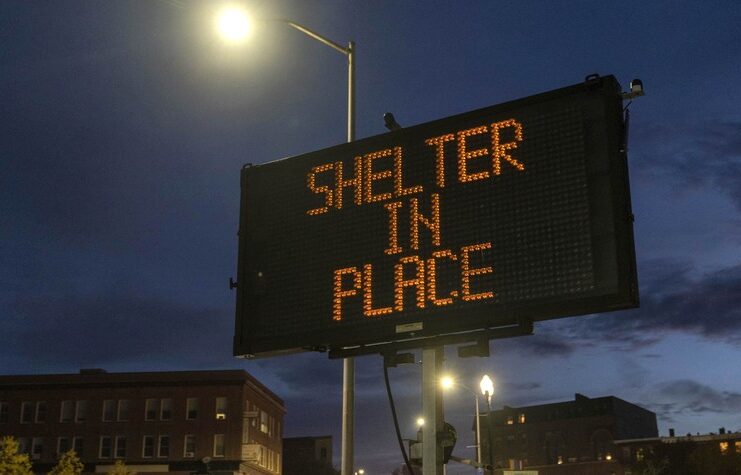Via Bearing Arms by Tom Knighton | 8:30 AM on January 16, 2024
The Department of Homeland Security isn't who I typically think of when it comes to discussing of mass shootings, or any mass casualty attack, but I couldn't give you a good reason why. After all, if security of the homeland is their mission–and it's right there in the name–then why wouldn't they be? Sure, the FBI and ATF are who we typically see respond, and they're with the Department of Justice, but preventing such attacks would certainly make the homeland safer.
It seems that while they don't make a lot of waves in the aftermath of something like a mass shooting, they're still doing things.
The problem?
Well, a recent report about mass casualty attacks tries to argue that motives are really hard to discern.
In and of itself, that's not a huge deal, but it's what's not mentioned in this report that has me concerned.
A toxic brew of ideological extremism, blended with rage, anger and violent tendencies is making it increasingly difficult for authorities to identify motivations behind mass casualty attacks in America, according to a new assessment by the Department of Homeland Security.
The confidential analysis, distributed to law enforcement on Jan. 10 and obtained by ABC News, describes the growing challenge posed by perpetrators who “espoused and engaged with an array of narratives,” often online, “likely fueling their mobilization to violence.”
Those attackers' range of beliefs made it easier to escape the longstanding templates law enforcement uses to catch would-be threats – and made it harder for police to intervene or secure potential targets, the analysis found.
“Since 2018, we have observed mass casualty attacks in which the perpetrators held multiple grievances, challenging our ability to identify a primary motive,” the bulletin said.
Examining eight attacks in the past five years which collectively killed 47 people and injured nearly 130 more, DHS' analysis found the “recent attackers influenced by mixed factors complicate target identification for law enforcement.”
Understanding what spurs a mass killer to action is a crucial piece of the intervention puzzle, experts say. And, the evolving threat environment – heightened by conflict in the Middle East and fueled by hate speech rampant on social media – requires a more elastic screening process to spot warning signs among would-be attackers that might otherwise go unheeded.
“We can no longer afford to look at emerging threats the same way we looked at them 10 years ago,” said John Cohen, a former senior official in the Department of Homeland Security, now an ABC News contributor. “Individuals who now engage in mass casualty attacks will typically adopt a blend of ideological beliefs and personal grievances that they cultivate through the consumption of online content – and if that is not recognized by investigators, they aren't going to understand what they are seeing.”
What's missing in this discussion is examples of precisely which mass casualty attacks they opted to look at, because that might tell us a lot.
After all, we've seen the reports of what various shooters said about their own motivations. Take an attack like El Paso. Yes, it was a racist attack, but it was racism driven by an extreme form of environmentalism, for example.
This is likely the blending of ideologies mentioned above.
What I find interesting here is that when it was simply racism motivating a particular strain of attack, people like DHS had no problem calling it what it was. Now that there are elements of extreme leftism behind attackers, now suddenly the waters are too muddied to make a determination as to just what the motive is.
Understand that I don't blame every Democrat or even every environmentalist for what happened in El Paso. It's simply not their fault that someone took a pretty basic position and warped it to justify murdering innocent people.
Ironically, the one example mentioned in the report is one where we don't have all that much ambiguity at to the motive.
The man who opened fire on New York City subway passengers in April 2022 had “posted hundreds of videos on YouTube about his anger toward law enforcement, various ethnicities, and religions, but only mentioned the subway a handful of times to highlight the inability of government officials to protect the public in recent subway attacks, based on a review of his social media content,” the bulletin said, adding that “comparatively, most [domestic violent extremist] attackers with a singular motive focus on traditional, predictable targets aligned to ideological grievances and offer opportunities for target hardening.”
But the killer was a black supremacist, which ties in with all of that particular kind of hate. They're not that different than your average non-fed Klan member in that way. Either non-fed Klan member.
Yes, he hated cops and various ethnicities, but that's been a hallmark of black supremacy since at least then 1970s.
What's interesting, though, is black supremacy isn't thought of as right wing. Sure, it doesn't look much different from white supremacy, which is thought of that way, but it's typically a leftist ideology.
If they're trying to take this very simple motivation and pretend it's a smorgasbord of motivations, then it raises questions about the rest of what DHS is trying to peddle to the American people.
Especially since we've seen snippets from a few other mass casualty attacks such as Louisville, Kentucky when a mass shooting was carried out by a disturbed individual hoping to trigger gun control, or the insane anti-white ramblings we've seen from the Nashville shooter.
None of these are ambiguous, either. How DHS can't seem to understand that is absolutely baffling to me, unless you remember how various federal agencies have been acting in recent years. They're not about finding the truth, but advancing partisanship.
Apparently, DHS is doing stuff after mass shootings, and it's covering for the White House's political allies.
Read in its entirety at bearingarms.com.
READ NEXT: Verdict Announced In Trump Defamation Case


